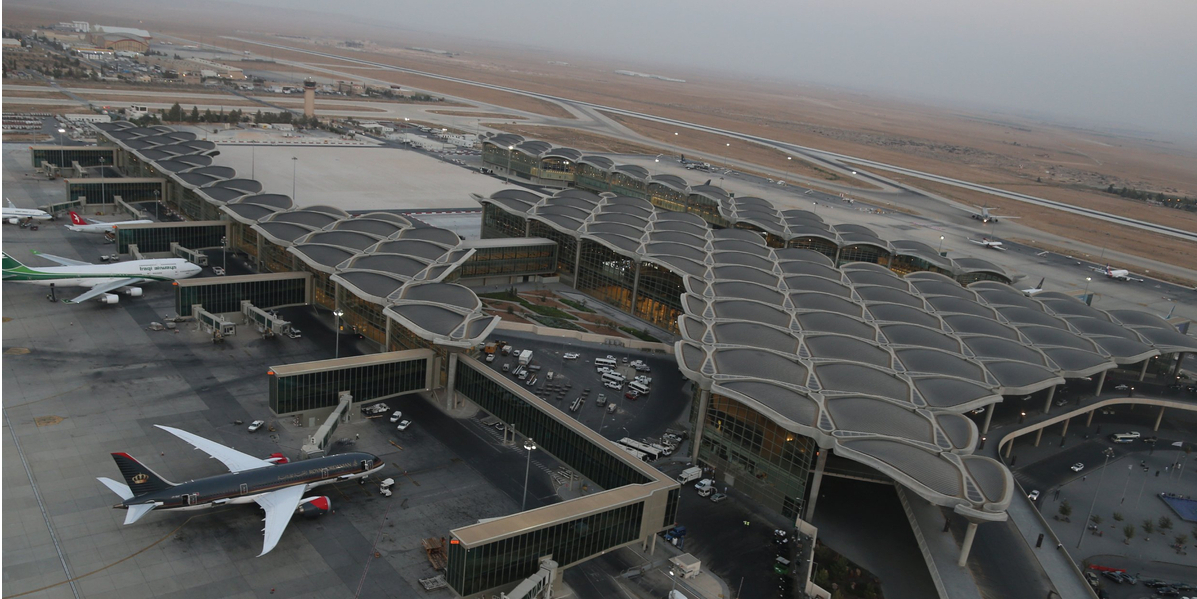
Queen Alia International Airport (QAIA), Jordan’s primary aviation hub, faces temporary headwinds amid regional tensions while maintaining its position as a crucial economic driver for the kingdom. Recent traffic data reveals the complex landscape of post-pandemic recovery and regional challenges affecting this vital infrastructure asset.
October 2024 brought notable challenges to QAIA’s operations, with passenger traffic declining 8.6% year-over-year to 675,209 travelers. This decrease reflects the broader impact of ongoing regional tensions, particularly in Gaza and Lebanon.
The airport also experienced reduced aircraft movements, recording 5,486 flights a 16.2% decrease from the previous year. Cargo operations saw a similar trend, handling 6,021 tons, down 7.3% compared to October 2023.
Year-to-date figures further illustrate these challenges, with total passenger traffic reaching 7,465,802, marking a 6.6% decrease from 2023. However, there’s a silver lining in cargo operations, which showed impressive growth of 16.1%, totaling 63,774 tons.
QAIA stands out as a modern aviation facility designed to handle up to 15 million passengers annually. The airport’s commitment to excellence has garnered significant recognition within the industry. Most notably, it has maintained first place for eight consecutive years in the Airport Service Quality Survey’s ‘Best Airport by Size and Region: Middle East’ category.
This achievement is complemented by its consistent top rankings in the ‘Best Airport by Region: Middle East’ category for four straight years. In a remarkable achievement for 2024, the airport received a prestigious 4-Star Airport Rating from SKYTRAX, further cementing its reputation for excellence in service and facilities.
The airport’s environmental achievements mark it as a pioneer in sustainable aviation practices across the Middle East. In 2022, QAIA reached a significant milestone by becoming the first airport in the region to achieve Level 4+ ‘Transition’ status in the Airport Carbon Accreditation Program.
This certification, valid until 2025, demonstrates the airport’s comprehensive approach to reducing its carbon footprint and promoting sustainable operations. Additionally, QAIA broke new ground as the first Middle Eastern airport to secure Level 3 Airport Customer Experience Accreditation, which has been renewed through January 2025.
According to IATA Consulting’s comprehensive study, the airport’s economic impact is substantial and growing. In 2019, QAIA supported 238,000 jobs and contributed JOD 2.5 billion (8.9%) to Jordan’s GDP. Looking ahead, projections for 2032 are even more impressive, with expectations of: 278,000 supported jobs across the economy JOD 3.9 billion contribution to GDP Continued dominance in handling over 97% of passenger traffic and 99% of cargo operations
Despite current challenges, Airport International Group CEO Nicolas Deviller remains optimistic about QAIA’s future. The focus continues to be on expanding airline partnerships and enhancing destination offerings while maintaining the airport’s reputation for excellent service.
As Jordan’s primary gateway to the world, QAIA’s resilience in facing regional challenges while maintaining high service standards demonstrates its crucial role in the kingdom’s economic and social fabric. The airport’s ongoing commitment to excellence, environmental leadership, and passenger experience positions it well for future growth despite current regional tensions.


